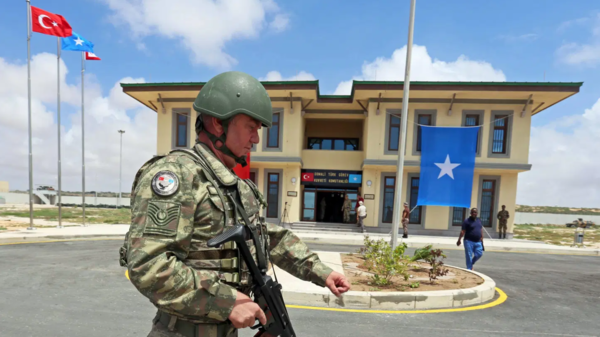
Latest News Regarding
Horn of Africa
Somalia’s opposition urges Turkey not to send arms to police unit
Somalia’s opposition urges Turkey not to send arms to police unit




By Abdi Sheikh
Source: Thursday December 17, 2020
A photo taken in Turkey’s biggest overseas military base in Mogadishu. (File photo: Reuters)
MOGADISHU (Reuters) – Somalia’s opposition says it has written to Turkey urging it not to send a planned shipment of weapons to a special police unit that they fear incumbent President Mohamed Abdullahi Mohamed could use to “hijack” forthcoming elections.
Political tensions have been high in the Horn of Africa country, stoked by opposition anger over a delay in holding the elections for both chambers of parliament.he polls were initially planned for this month but that plan was scrapped following disagreements over the composition of the electoral board.
On Tuesday opposition supporters marched in the capital Mogadishu denouncing the president for the delay.
In the letter addressed to Turkey’s ambassador in Somalia and seen by Reuters, opposition candidates said they had learned Turkey was planning to deliver 1,000 G3 assault rifle and 150,000 bullets to Harma’ad, a special unit in Somalia’s police, between Dec. 16 and Dec. 18.
Abdirahman Abdishakur Warsame, chairman of the Wadajir (unity) party and one of the candidates who jointly wrote the letter, confirmed its authenticity to Reuters.
The candidates, the letter said, are “worried about this amount of weapons … flooding the country at this sensitive election time.”
The president “has already used the Harma’ad forces for coercion and rigging of regional elections, and so there is no doubt the same Harma’ad forces and the weapons from Turkey will be used to hijack the upcoming elections,” it said.
There was no immediate comment from Turkish officials.
Turkey provides training to the police unit. The letter urged Ankara to delay the delivery of weapons and ammunition until after the delayed elections have been conducted.
Somalia’s information minister Osman Abukar Dube did not immediately respond to Reuters calls and a text message seeking comment.
In recent years Turkish President Tayyip Erdogan has become a close ally of the Somali government. Ankara has built schools, hospitals and infrastructure and provided scholarships for Somalis to study in Turkey. In 2017, Turkey opened its biggest overseas military base in Mogadishu.
However that alliance has inserted Somalia into the centre of a regional struggle between Saudi Arabia and the United Arab Emirates on one side and Qatar backed by Turkey on the other.
Writing by Elias Biryabarema, Editing by William Maclean
Somalia orders remaining diplomatic staff in Nairobi to return in five day
Somalia orders remaining diplomatic staff in Nairobi to return in five days




Source: Hiiraan Online, Thursday December 17, 2020
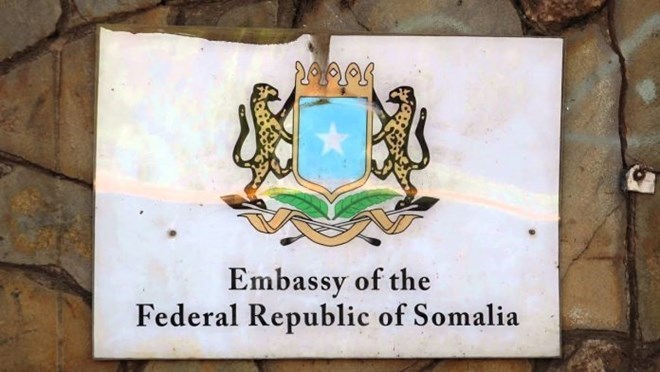
MOGADISHU (HOL) – Somalia has ordered all its embassy officials and families to vacate Kenya within five days amid an escalating diplomatic war with Kenya which has since remained mute over the tiff.Ads By The Ministry of Foreign Affairs said in a statement Wednesday it had instructed its all remaining staff at the embassy to leave Nairobi with immediate effect.
ts ambassador Mohamed Nur was ordered home late November followed by severance of diplomatic ties this week which in effect meant the embassy was no longer operational.
Mogadishu also ordered Kenya’s diplomatic staff on Monday to leave the country in seven days.
Meanwhile, Kenya has said it will not hit back at Somalia but will instead constitute a team to resolve the matter noting the two countries had long-running relations.
“We all know that Kenya and Somalia have a lot in common and many issues that bring us together. We have a history that unites us. We have economic and even social cohesion.” There is also the issue of diplomacy and international relations that require sincere cooperation. Do good to me, and I will do good to you,” Kenya spokesman Cyrus Oguna told journalists Tuesday.
Somalia has variously accused Kenya of ‘blatant interference’ in its internal affairs and has since taken a raft of measures in response. However, opposition groups have termed it a campaign ploy by president Mohame
US Formally Lifts Sudan Sanctions
US Formally Lifts Sudan Sanctions
Source: The Washington Post published on 14 December 2020 an article titled “U.S. Lifts Sudan’s Designation as a State Sponsor of Terrorism” by Max Bearak and Naba Mohieddin.
The United States formally rescinded on 14 December Sudan’s status as a state sponsor of terrorism, removing Khartoum’s biggest barrier to accessing international lending institutions and economic development.0 commentsLabels: Abdalla Hamdok, al-Qaeda, diplomacy, economic development, IMF, Israel, sanctions, state sponsors of terrorism, Sudan, US
Int’l partners express concern over the ongoing disagreements over electoral process
Int’l partners express concern over the ongoing disagreements over electoral process



Source: UNSOM, Wednesday December 16, 2020
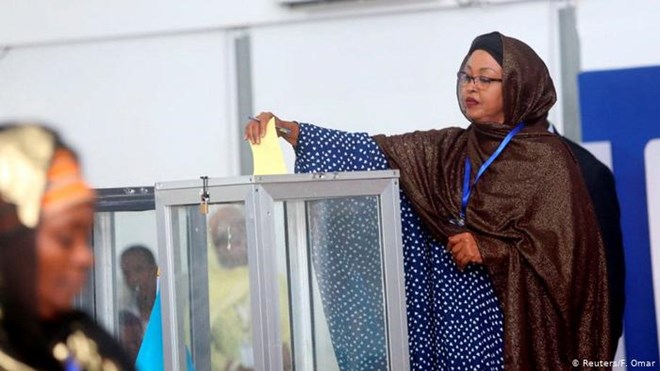
The recent Somalia Partnership Forum enabled all involved to openly exchange views on current developments in the country and to agree on the 2021 Mutual Accountability Framework, which sets out key priorities on inclusive politics, security and justice, and social and economic development.
However, Somalia’s international partners remain deeply concerned about the ongoing disagreements over the implementation of the 2020/21 electoral process. Further discussion and agreement is also needed on how the 30 per cent women’s quota in committees, amongst delegates, and for seats will be assured.
5These disagreements need to be resolved in a manner that respects the 17 September political agreement and the implementation protocols signed by the Federal and Federal Member State (FMS) leaders on 1 October. Initiating a parallel process or imposing disputed electoral management committees that do not meet the agreed criteria undermines the legitimacy of the electoral process and creates instability.
We therefore reiterate our call on the Federal and FMS leaders to reconvene urgently and to reach out to other stakeholders to resolve concerns about the management of the electoral process through consensus-building so that timely, transparent, and credible elections embraced by the Somali people and all key stakeholders can take place. To that end, we welcome Prime Minister Mohamed Hussein Roble’s commitment to convene the leaders in Mogadishu following his current visits to the Federal Member States.
We stand ready to provide support to the Federal and State electoral committees once the dialogue to resolve the dispute over their composition is successfully concluded. Transparency and good faith in implementing the electoral process according to the agreed rules will also be important.
We also stress that regular meetings of the Federal and FMS leaders throughout the electoral process and continuation of the Dhusamareb spirit of compromise will help keep the electoral process on track. The institutionalization of such meetings of the leaders will help prevent the recurrence of a protracted political impasse. To that end we would urge parties to recall commitments made at the Somalia Partnership Forum under the 2021 Mutual Accountability Framework to a secure electoral process based on ongoing dialogue, and to the establishment of a mechanism for dialogue on this process to meet not less than monthly.
In the coming weeks, we look forward to working with the Federal Government and FMSs to advance other key decisions from the Somalia Partnership Forum that require immediate follow-up. These include safeguarding the gains from the review of the Constitution prior to elections, consultations on developing the 2024/25 elections roadmap, signing the audit bill, finalizing the Somali Transition Plan, and preparing for the force generation conference planned for January 2021.
In the meantime, we call on all stakeholders to refrain from any statements or actions that could create tensions or incite violence.
Xi calls for closer BRI cooperation with Somalia
Xi calls for closer BRI cooperation with Somalia




Source: XINHUA, Monday December 14, 2020
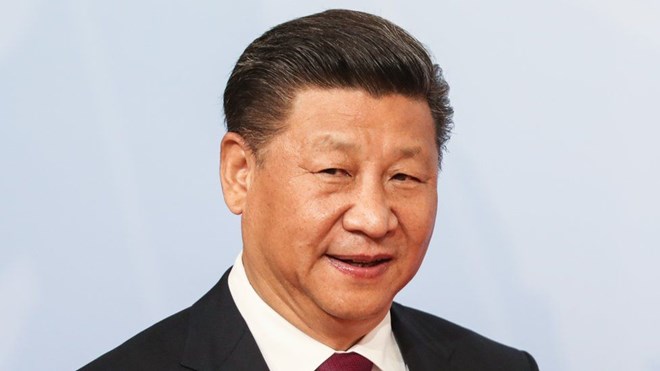
Chinese President Xi Jinping said Monday that he is ready to work with Somali President Mohamed Abdullahi Mohamed to enhance bilateral cooperation within the framework of the Belt and Road Initiative (BRI) for the benefit of the people of both countries.
XI made the remarks in an exchange of congratulatory messages with his Somali counterpart celebrating the 60th anniversary of the diplomatic relationship between the two countries.
Somalia takes case against Kenya to IGAD as Bihi meets Kenyatta
Somalia takes case against Kenya to IGAD as Bihi meets Kenyatta




Source: Hiiraan Online, Monday December 14, 2020
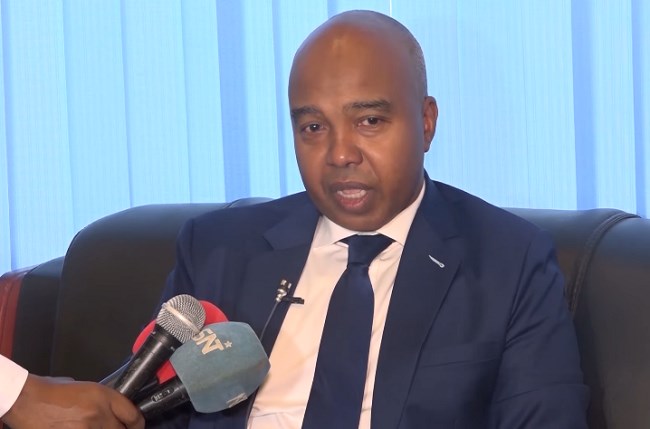
MOGADISHU (HOL) – Somalia said Sunday it is engaging the regional bloc IGAD to resolve the ongoing diplomatic disputes with its neighbour Kenya as the two countries go on a diplomatic offensive against each other.
Few hours after Somaliland president Muse Bihi arrived in Nairobi, Mogadishu announced it had sought the intervention of the eight member IGAD bloc to resolve the matter.
“In response to the Federal Government of Somalia letter against Kenya, which was submitted to H.E. Abdalla Hamdok, PM of the Republic of Sudan and the Chair of the IGAD Assembly of Heads of State and Government, the IGAD will hold a summit in Djibouti on Dec 20 on this matter,” the Ministry of Foreign Affairs said in a tweet some 30 minutes to mid night.
Bihi is expected to hold talks with president Uhuru Kenyatta today in what will be a much-followed affair by Villa Somalia.
The Ministry of Foreign Affairs in Kenya said the talks will focus on ‘mutual interest’.
“Somaliland is an important partner in the Horn of Africa region in the fight against terrorism and particularly Al-Shabaab,” the ministry said in a tweet.
Somalia expelled Kenya’s ambassador late last month over ‘interference of internal affairs.’
Uhuru to discuss trade, security with visiting Somaliland leader Bihi
Uhuru receives Somaliland President Musa Abdi at State House




Source: theSTAR, Monday December 14, 2020
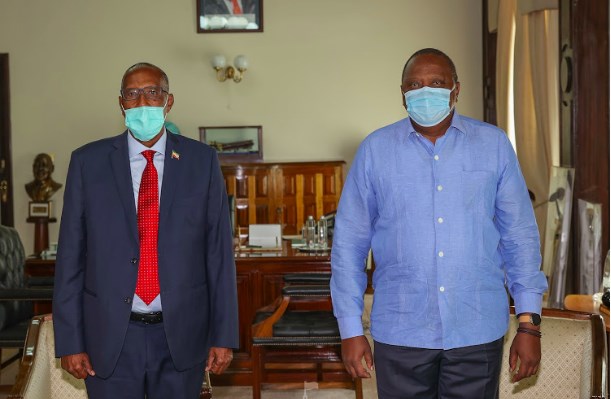
President Uhuru Kenyatta has hosted bilateral talks between Kenya and Somaliland delegation led by President Musa Bihi Abdi at State House on Monday.
President Abdi arrived in the country on Sunday for a three-day official visit.
During the meeting, the two leaders initiated discussions on a number of subjects of mutual interest between Kenya and Somaliland.
The two delegations are set to meet again on Tuesday to finalise the talks.
Kenya has no diplomatic presence in Somaliland but takes cognizance of the political and economic stability of the region.
The country is keen to enhance and broaden trade in goods and services, as well as investment as the cornerstone for long-term development cooperation with the region.
Other issues of mutual interests include information sharing on security particularly in countering terrorism in the Horn of Africa.
Foreign Affairs CS had pointed out that intensified cooperation is being sought in the banking and financial sector to accelerate more investment opportunities for both parties.
Stronger EU action against human rights violations
Stronger EU action against human rights violations
Source: EU, 10/12/2020 – 19:33News
10-12-2020 – HR/VP Blog – At Monday’s Foreign Affairs Council, member states agreed to launch a new EU Global Human Rights Sanctions Regime to strengthen our collective action in this field. Taking action on human rights is not only the right thing to do. It is also in our interest: more human rights means more freedom, prosperity and peace, for us all.

One year ago, during the first Foreign Affairs Council that I chaired, EU Foreign Ministers gave their political agreement to create a new EU instrument to go after the perpetrators of serious human rights violations and abuses worldwide. The road has been quite long and complex, as I have described earlier. But we now have arrived at a good outcome. The new regime enables us to impose sanctions regardless of where human rights violations and abuses occur, without having to create new, country-specific sanctions regimes as we had to do until now. This means we have new tools to increase accountability and fight impunity.
Human rights, we often say, are in the DNA of the European Union. However, how do we defend them in a world where, demonstrably, respect for human rights is in retreat? Every day, in different parts of the world, the EU and its member states are working in concrete ways. On the ground, we are observing trials and elections, supporting human rights defenders and taking them out of danger, working on projects to advance the rights of women and supporting civil society.
But we all know about the hard realities of today’s world. Despite our best efforts, slavery, child soldiers, torture, the killing of civilians, human trafficking and many more crimes are still happening every day. The world is full of examples: in the Democratic Republic of Congo and elsewhere, women are subjected to widespread sexual violence as part of the conflict ravaging the country; in Syria, Afghanistan, Yemen and beyond, families are forced to flee their homes because of conflict; in many countries, courageous women and men languish in prison because they dared express an opinion; and we have all witnessed how in Belarus peaceful protesters are met with violent repression.
Going beyond resolutions and statements: EU actions to support human rights
When this happens, the EU must go beyond adopting resolutions and making statements – we must act. We already use trade agreements, election observations, crisis management missions, human rights dialogues and guidelines to address these issues on the ground. The EU can also respond to human rights violations by suspending development aid (as we have for Burundi) or withdrawing “everything but arms” trade preferences (temporarily lifted in the case of Cambodia).
And then there are sanctions. The EU has, for years been using this tool to target human rights violations and abuses. We have used visa bans, asset freezes and other measures, such as banning the sale of weapons and equipment used for internal repression, to target the people and entities responsible. We have done so, for example in the cases of Libya, Venezuela, Belarus, DRC and Myanmar.
“We no longer need to agree a specific sanctions framework for every country where we know violations occur, which will save us a lot of time.”
One year ago, we decided that time has come to take another step: to develop a sanctions regime that is truly global in scope. That work has now come to fruition.
The new EU Global Human Rights Sanctions Regime will not be bound by borders, or specific to a country. It will allow us to target state and non-state actors, regardless of where they are and regardless of whether they commit violations and abuses in their own state, in another state or across borders. We no longer need to agree a specific sanctions framework for every country where we know violations occur, which will save us a lot of time.
The new regime will include a dedicated derogation, which allows member states to grant an authorisation to humanitarian operators to ensure the civilian population does not suffer because of the behaviour of their leaders.
What lies ahead?
The adoption of the EU Global Human Rights Sanctions regime is an important milestone, but this is not the end of our work. We now need to determine how we use it to the greatest effect and which concrete cases should be listed. While both member states and myself as High Representative can make proposals, it is for the member states to decide, by unanimity. It is no secret I had proposed the use of qualified majority voting to enable us to take faster decisions on listings, but not all member states could agree to this.
Any decision on listings will no doubt be a delicate exercise where we need to tread carefully. But one thing is clear: from the outset we will need to demonstrate political will to use this new regime and to have meaningful and legally robust listings.
In a world where some try to repudiate or redefine the universality of human rights, the EU must be more than a moral force. We need to be more assertive and act. As the Irish poet Seamus Heaney wrote, we must “provide a worldwide amplification system for “the still, small voice”. To do that, we needed this EU Global Human Rights Sanctions Regime.
In sum, a lot will depend on how exactly we, collectively, will decide to use this new tool. But we have given a signal to the world’s human rights abusers: stronger EU action on human rights is now possible.
10 December 2020 Human Rights
Source: UN, 10 December 2020 Human Rights
UN Secretary-General António Guterres has called for human rights to be put “front and centre” of COVID-19 response and recovery globally in order to achieve a better future for people everywhere.
The UN chief made the appeal in his message for Human Rights Day, observed on Thursday.
“People and their rights must be front and centre of response and recovery. We need universal, rights-based frameworks like health coverage for all, to beat this pandemic and protect us for the future”, he said. https://news.un.org/en/sites/all/themes/bootstrap_un_news/localization/webcast-player/?videoId=6215000678001&autoplayparam=0#t=00h00m00s
Violations hurt us all
The pandemic has reinforced two fundamental truths about human rights, said the Secretary-General, starting with the observation that violations harm us all.
“The COVID-19 pandemic has had a disproportionate impact on vulnerable groups including frontline workers, people with disabilities, older people, women and girls, and minorities. It has thrived because poverty, inequality, discrimination, the destruction of our natural environment and other human rights failures, have created enormous fragilities in our societies”, he said.
“At the same time, the pandemic is undermining human rights, by providing a pretext for heavy-handed security responses and repressive measures that curtail civic space and media freedom.”
Divisiveness doesn’t work
The second truth is that human rights are universal and protect everyone, underscoring how effective pandemic response must be based on solidarity and cooperation.
“Divisive approaches, authoritarianism and nationalism make no sense against a global threat”, he stressed.
Just prior to the pandemic, the Secretary-General issued his Call to Action for Human Rights. Described as a seven-point blueprint for positive change, it spells out the central role of human rights in areas such as crisis response, gender equality, public participation and sustainable development.
“On Human Rights Day and every day, let’s resolve to act collectively, with human rights front and centre, to recover from the COVID-19 pandemic and build a better future for all”, he said.
Rights Declaration ‘essential’ amid global chaos
Human Rights Day commemorates the UN General Assembly’s adoption of the Universal Declaration of Human Rights on 10 December 1948.
Coronavirus Portal & News Updates
Readers can find information and guidance on the outbreak of the novel coronavirus (2019-nCoV) from the UN, World Health Organization and UN agencies here.For daily news updates from UN News, click here.
More than seven decades on, the milestone document provides an essential framework for the world to “recover better” from the pandemic, the UN’s more than 130 independent rights experts said in a statement, echoing the Secretary-General’s message.
They underlined “the centrality of the Universal Declaration of Human Rights to the international human rights protection system” at a time when the world faces not only the pandemic, but also climate change, racism and discrimination.
Stating that 2020 will be remembered for its “unique existential challenges”, the experts said commemoration of the Universal Declaration of Human Rights in the closing days of the year serves as “an important and powerful message: the global threats to humanity demand global responses that rest on multilateralism, cooperation, and solidarity.”
Independent voices
The experts who issued the statement were appointed by the UN Human Rights Council to monitor specific country situations or human rights issues in all regions of the world.
They are independent of the UN, and serve in their individual capacity, and do not receive a salary for their work.♦ Receive daily updates directly in your inbox – Subscribe
US Urges Withdrawal of Eritrean Troops from Ethiopia’s Tigray Region
US Urges Withdrawal of Eritrean Troops from Ethiopia’s Tigray Region
Source: The Associated Press published on 11 December 2020 an article titled “Ethiopia Returns Refugees Who Fled Tigray Fighting, to Alarm” by Cara Anna.
The U.S. State Department says it believes Eritrean troops are active in Tigray Region, calling the situation a “grave development.” It urged they be withdrawn immediately. 0 commentsLabels: aid, ENDF, Eritrea, Ethiopia, refugees, security, Sudan, Tigray Region, TPLF, US
UN calls for joint efforts to end gender based violence in Somalia
UN calls for joint efforts to end gender-based violence in Somalia




Source: Xinhuanet, Thursday December 10, 2020
Insecurity, gender inequality and recurring humanitarian crises heighten risks for sexual violence in Somalia, the United Nations says. (UN Photo/Stuart Price)
The UN on Wednesday called for concerted efforts to eliminate gender-based violence (GBV) in Somalia and to make services more accessible to women and girls.
James Swan, UN Secretary-General’s Special Representative for Somalia said since the outbreak of COVID-19, emerging data and reports from those on the frontlines have shown that all types of violence against women and girls, particularly domestic violence, have intensified and Somalia has not been spared from this scourge.“Regardless of any progress made against the pandemic, more needs to be done to prioritize addressing violence against women during the COVID-19 response and recovery efforts, and this includes funding to fill gaps in service provision and raising awareness and ensuring accountability,” Swan said in a statement issued as 16 Days of Activism against GBV campaign which will end on Thursday.
Throughout the 16 day period, Swan said UN agencies in Somalia have worked with the government and civil society to highlight the need for ending GBV and ensuring essential services for survivors of violence during the COVID-19 crisis.
The UN’s activities include awareness campaigns, public debates and workshops, round-table discussions, and advocacy in relation to the legislation of sexual offences.
According to Swan, COVID-19 cases across the globe have strained health services and essential services in helping GBV survivors, as domestic violence shelters and helplines have reached capacity.
In Somalia, the UN envoy said, the GBV Information Management System data indicated an escalation in GBV cases during COVID-19.
According to the UN, women and girls with disabilities require priority attention as they are at greater risk of experiencing discrimination, exploitation and violence.
Ethiopia: Ethnic Issues Beyond Tigray
Ethiopia: Ethnic Issues Beyond Tigray
Source: The International Crisis Group broadcast on 4 December 2020 a 28 minute podcast titled “As Conflicts Mount, Where Does Ethiopia Go from Here?” with Adem Kassie Abebe, International Institute for Democracy and Electoral Assistance.
Numerous cases of ethnic violence continue in Ethiopia that extend well beyond Tigray Region. The author believes the overriding issue in Ethiopia today is the conflict between ethnic federalism and pan-Ethiopianism. Abiy Ahmed, he argues, is trying to occupy the middle ground between these two philosophies although his opponents see him in the pan-Ethiopian camp. 0 commentsLabels: Abiy Ahmed, Amhara, democracy, dialogue, elections, Ethiopia, ethnic federalism, IDPs, insurgency, nationalism, Oromo, pan-Ethiopianism, secession, Tigray Region, TPLF, Yugoslavia
Ethiopia’s PM Abiy Ahmed arrives in Kenya to open border post
Ethiopia’s PM Abiy Ahmed arrives in Kenya to open border post




Source: TheEastAfrican, Wednesday December 9, 2020

Kenya’s President Uhuru Kenyatta and Ethiopian Prime Minister Abiy Ahmed were in northern Kenya on Wednesday for the opening of the One Stop Border Post in Moyale, Marsabit County.
Abiy inspected a guard of honour mounted by the Kenya Defense Forces (KDF) after which he toured the facility along with his host Mr Kenyatta.
The one stop border post, under construction along the Ethiopia-Kenya border, is being built alongside the 502-kilometre Hawassa-Moyale road project in Ethiopia, which is part of a larger plan for a Mombasa-Nairobi-Addis Ababa road corridor.
Border conflicts, Lapsset
Mr Abiy’s tour is a significant one, with the visit expected to focus on the shared border between the two countries and the Lamu Port-South Sudan-Ethiopia-Transport (Lapsset) corridor.
It was hoped that the border post would be commissioned last year after construction was completed in 2018 at a cost of over Ksh800 million ($8 million), but it was postponed due to tensions at the border.
The perennial conflicts in the area is one of the significant talking points that the two leaders are expected to focus on in their meetings.
The Ethiopia-Kenyan border stretches for over 830 kilometres, making the official border point in Moyale a significant input in boosting trade between the two countries.
Maryland lawyer indicted in scheme to obtain millions in Somali government assets
Maryland lawyer indicted in scheme to obtain millions in Somali government assets




Source: Washingtownpost, By Ann E. MarimowTuesday December 8, 2020
More than a decade ago, Bethesda lawyer Jeremy W. Schulman began working to reclaim millions of dollars belonging to the government of Somalia from accounts frozen during the country’s years of political turmoil. Now, Schulman is facing the possibility of decades in prison after the government accused him of defrauding the people he was claiming to help.
Prosecutors say Schulman, who was indicted last week on federal fraud charges, exploited connections to the Somali government and pretended to officially represent the war-torn country’s interests to enrich himself. His lawyers say that the Justice Department has it wrong and that Schulman was a trusted adviser and advocate of the Somali people. Schulman, 47, made an initial appearance Monday before U.S. Magistrate Judge Gina L. Simms and through his lawyer pleaded not guilty to the charges. The hearing was held by videoconference in U.S. District Court in Maryland because of the pandemic.
“We firmly believe the Department of Justice is misinformed and has been derelict in its responsibility to thoroughly investigate and identify all exculpatory evidence,” Schulman’s legal team said in a statement provided by attorney Paul W. Butler.
“We are confident that when permitted an opportunity to tell his story, Mr. Schulman will be wholly vindicated of any criminal conduct, let alone fraud.”
Prosecutors tell a different story of fake documents, misrepresentations and a five-year scheme to gain control of $12.5 million. Schulman did not have authority to act on behalf of the East African country, prosecutors say, and instead forged letters to present to banks and other financial institutions.
When the Somali Democratic Republic collapsed in the early 1990s amid a civil war, the Central Bank of Somalia asked banks around the world to freeze financial assets belonging to the government to prevent withdrawals until a stable government returned to power. Some accounts came under control of the Office of the New York State Comptroller. The Federal Reserve Bank of New York also held gold and currency belonging to Somalia.
The 11-count indictment, returned by a federal grand jury in Maryland last week, outlines a conspiracy carried out by Schulman, an unnamed former leader of the Central Bank and that person’s relative, Abdiaziz Hassan Amalo of Maryland, among others. The former bank official had been appointed as an adviser to the transitional Somali government in 2009, but prosecutors say Schulman inflated the official’s position and authority and inserted “deceptive or incorrect information” into documents to gain access to the assets.
As a result of the alleged scheme, Schulman personally received more than $880,000 at the end of 2013, an increase of more than $400,000 from his compensation the previous year, according to the 31-page indictment.In one instance, prosecutors say, Schulman and Amalo forged a letter purporting to be from the attorney general of the Republic of Somalia in an attempt to get funds from a bank, which held more than $1.5 million in assets. After several drafts, the indictment says Schulman congratulated Amalo on his “great work” and emailed the forged letter to the bank in August 2010.
Amalo wrote to Schulman, according to the indictment, “I’m glad we got this time right. Make the Magic happen on those banks now LOL!!!”
Amalo was arrested and charged with bank fraud and false statements in 2017. His case is still pending and his lawyer had no comment.
In June 2013, one of the banks and the New York comptroller conditioned the release of the assets on official certification from the U.S. State Department.
Schulman’s lawyer said that his efforts were “fully transparent” and that he had the authority to act on behalf of the Somali government. His team worked “tirelessly to assist a nation desperately in need of financial resources to ensure the government’s recovery from nearly two-decades of civil war,” Schulman’s lawyer said in the statement.
But the indictment says a State Department lawyer made clear in messages to Schulman that its certification did not permit Somalia’s president to delegate his authority to receive the funds to any third person, including to Schulman, and that any communication had to come directly from the president.
Even so, the indictment says, Schulman continued to communicate with the New York comptroller about releasing the assets without disclosing the instructions he had received from the State Department.
At the time of the alleged conspiracy, Schulman worked for the law firm Shulman Rogers. In a statement Monday, the firm said it is cooperating with the Justice Department and has had no association with Schulman since he left in 2016.
“The firm was not the subject of the investigation or the indictment. The indictment expressly states that the alleged actions were done without the firm’s knowledge. In fact, when the firm is mentioned (Law Firm A), the indictment makes clear the firm was deceived by Mr. Schulman, and that Mr. Schulman concealed his alleged activities from the firm,” according to the statement.
Schulman is a founding partner of the Bethesda-based law firm Schulman Bhattacharya and chairman of the firm’s commercial litigation and arbitration group. Schulman touts his Somalia-related work on the firm’s website, noting his representation of the government on matters including an investigation of financial corruption allegations asserted by the United Nations Monitoring Group for Somalia and Eritrea.
He previously worked at firms in Washington and New York. A graduate of State University of New York at Buffalo School of Law, Schulman began his career as a clerk to Judge John M. Steadman of the D.C. Court of Appeals.
Schulman is also listed as a member of the honorary council and a former trustee of the Round House Theatre in Bethesda.
Lawyers expect a three-week jury trial, and Schulman’s attorney asked the judge not to impose domestic travel restrictions.Schulman has “many ties to the community, sufficient assets and a successful, active legal practice,” Butler said. “He needs to continue with his very successful career while he confronts this matter.”
What next for Ethiopia and its neighbours: Somalia and Eritrea

What next for Ethiopia and its neighbours: Somalia and Eritrea




By Namhla Matshanda
Source: The conversation, Tuesday December 8, 2020
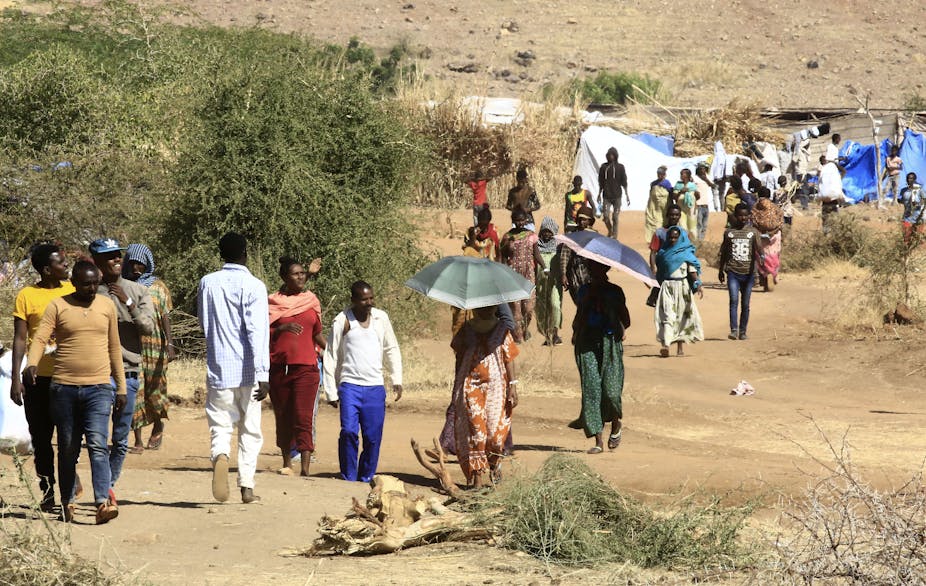
Ethiopian refugees who fled the fighting in Tigray Region are pictured at Um Rakuba camp in Eastern Sudan. Ashraf Shazly/AFP via Getty Images
From a historical standpoint, the current conflict in Ethiopia fits within an established political pattern. There have been power struggles between the centre and the border regions since the modern Ethiopian state was established in the late 19th century.
The Ethiopian state was built on the back of conquest. Regions that existed on the margins were incorporated into the Ethiopian imperial state. These regions were occupied by groups with vastly different cultures from those of the centre. For example the capture of the Harar city state in 1887 paved the way for King Menelik II to expand his territorial conquest to the lowland regions that were occupied by Somali speaking people. This territorial expansion was almost complete by the end of the 19th century, when the imperial state began to consolidate its territorial limits.
This process coincided with the scramble for Africa, when European colonial powers shared out the continent among themselves. Across the continent groups of people who shared cultural and other affinities found themselves on opposite sides of international borders.l=CS&pfx=0&fu=8192&bc=31&ifi=2&uci=a!2&btvi=1&fsb=1&xpc=yvCplPxNJK&p=https%3A//www.hiiraan.com&dtd=161Despite being occupied by Italy between 1936 and 1941, Ethiopia was never colonised. Nevertheless, the creation of the imperial state led to tensions and sometimes armed struggles with people who occupied the border regions. One example is the Somali speaking people in eastern Ethiopia.
As a result, Ethiopian leaders have always been preoccupied with protecting its territorial integrity. This preoccupation has often involved neighbouring states with an interest in Ethiopian statehood, most notably Somalia and Eritrea.
Somalia has long-standing territorial claims on parts of eastern Ethiopia, which are predominantly occupied by Somali-speaking people. Eritrea on the other hand embarked on an armed struggle for independence from Ethiopia, which it attained in 1993. This was followed by a power struggle, which included a disputed border and competing ideas of national identity.
The current conflict in the country risks spilling over. This is because countries in the region have shown a proclivity for getting involved in each other’s business to achieve political gains at home. The interference occurs through shared borders and borderland regions that straddle similar groups of people.
Spillover
Ethiopia is a key political and economic state in the Horn of Africa, which is also home to Sudan, South Sudan, Eritrea, Djibouti and Somalia. It has been involved in two conflicts with its neighbours in the past 50 years – Somalia in the south-east and Eritrea in the north. In 1977 the Somali state, then ruled by Siad Barre, invaded Ethiopia in a bid to take back territory it claimed. The invasion was largely aided by Somalis in Ethiopia. Ethiopia emerged victorious with Cuban and Soviet assistance.
Then in 1998 Eritrea and Ethiopia went to war over the disputed border town of Badme. But the dispute was about more than a dusty border town. It was also about competing national identities. In 2000 the Algiers Agreement led to a ceasefire. But the standoff continued until the intervention of Ethiopia’s Prime Minister Abiy Ahmed in 2018.The current Somali state is in a decidedly weak position and poses no immediate threat to Ethiopia. The same cannot be said of Eritrea. It has not recovered from the outcome of the 1998-2000 war. Since the ceasefire in 2000 the threat of war has lingered between Ethiopia and Eritrea because neither country felt satisfied with the recommendations of the border commission that was appointed to settle the dispute.
The case of Somalia
Territorial tensions between Somalia and Ethiopia date back to the early 1960s when Somalia became independent. The new Somali government tabled significant claims on Kenyan, Ethiopian and French Somaliland territories at the newly established Organisation of African Unity. By the end of 1963 and early 1964, Ethiopia and Somalia were engaged in their first military confrontation, where Ethiopia asserted its dominance.
Somalia never gave up its claim on the eastern regions of Ethiopia. In 1977 the country decided to invade Ethiopia in a bid to regain the territory. Ethiopia was still reeling from a change of regime in which Marxist forces had overthrown the imperial regime of Emperor Haile Selassie.
Currently, Somalia has its own preoccupations which are likely to keep it inwardly focused. The country failed to hold scheduled parliamentary elections on 1 December. If the government and the different political parties do not agree on how to hold free and fair elections some groups might resort to violence.
Somalia’s security could also come under threat in 2021. Foreign peacekeeping troops who have been stationed in the country since the early 1990s are set to leave in 2021. With this scenario Al Shabaab could regroup and take advantage of the security vacuum.
And the Ethiopian troops stationed in Somalia were withdrawn in November 2020 shortly after the war in Tigray began.
Eritrea
Eritrea is the one player in the region with the potential to stoke the flames of war.
Despite the recent restoration of diplomatic ties between Ethiopia and Eritrea, there are still unresolved issues.
In particular, there are still lingering tensions between Eritrean President Isaias Afwerki and the leadership of the Tigray People’s Liberation Front.
The animosity stretches back three decades and has multiple sources.
Throughout the 1970s and 1980s the Tigrayans maintained an alliance with the Eritrean People’s Liberation Front in the Tigray struggle against the authoritarian Derg regime, a military junta that ruled Ethiopia from 1974 until it was overthrown in 1991.
But the two sides never imagined an alliance beyond their mutual struggle against the Derg.
Relations turned sour after the Tigray front came to power as a constituent party of the Ethiopian People’s Revolutionary Democratic Front in 1991. Once they defeated their common enemy their longstanding political and ideological differences resurfaced. The Tigrayans sought a democratic and decentralised Ethiopian state, while the Eritrean People’s Liberation Front envisaged an authoritarian unitary state for Eritrea.
These diametrically opposite views were bound to end in conflict. And so it was that the erstwhile allies become enemies.
The Ethiopian People’s Revolutionary Democratic Front went to war with Eritrea in 1998.
The eventual secession and independence of Eritrea generated a great deal of resentment in Ethiopia. Many saw it as an affront on the territorial integrity of the Ethiopian state.Involvement in the current Ethiopian conflict would be in Eritrea’s interests. Defeating the Tigray People’s Liberation Front would restore national pride lost during the 1998-2000 war.
But this would come at the expense of regional stability.
The Horn has had its fair share of disruption and violence resulting in millions of displaced people, as well as hundreds of thousands of refugees.Tens of thousands of people have already fled Ethiopia for Sudan since the Tigray conflict began. A worsening refugee crisis would inevitably burden Sudan. It could also lead to interventions from the different countries in the region
Ethiopia: Conflict in Tigray Not Over
Ethiopia: Conflict in Tigray Not Over
Source: The Washington Post published on 4 December 2020 an article titled “Ethiopia’s War in Tigray Shows No Signs of Abating Despite Government’s Victory Claims” by Max Bearak.
The article describes continuing conflict in Tigray region with the TPLF and its supporters apparently taking refuge in the more mountainous parts of the state. There is no indication the conflict will come to a quick end. 0 commentsLabels: Ethiopia, humanitrian crisis, ICRC, Mekelle, refugees, Tigray Region, Tigrayans, TPLF
Russia to Project Naval Power into Red Sea
Russia to Project Naval Power into Red Sea
Source: The Royal United Services Institute posted on 7 December 2020 an analysis titled “Russia’s Port Sudan Naval Base: A Power Play on the Red Sea” by Samuel Ramani, St. Antony’s College, Oxford.
The author identifies three potential benefits for Russia by establishing a naval facility at Port Sudan on the Red Sea. He also discusses the implications of this development for other countries vying for power in the Red Sea region: US, France, China, and Turkey. 0 commentsLabels: China, Djibouti, Eritrea, Mediterranean Sea, military, navy, Red Sea, Russia, Saudi Arabia, Sudan, Suez Canal, Turkey, US, Wagner Group
No more visas on arrival, Somalia tells Kenya amid diplomatic fallout
No more visas on arrival, Somalia tells Kenya amid diplomatic fallout




Source: Monday December 7, 2020
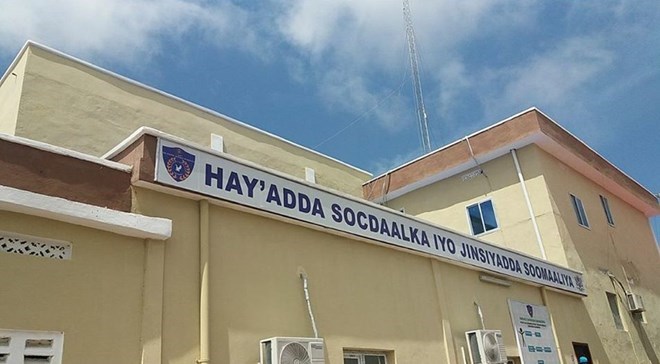
MOGADISHU (HOL) – Somalia has announced drastic travel requirements affecting Kenyan passport holders amidst an ongoing diplomatic row between the two countries.
The Department of Immigration announced Monday that Kenyan passport holders will now be required to obtain visas from Somali embassies ahead of travel.
This is a departure from the current situation where travelers from Kenya apply for visas with the immigration department and receive them upon arrival.
Third parties such as employers normally apply for visas for their employees in advance who then receive upon arrival.
“In line with the Federal government’s policy of ensuring security, improving migration management and reducing the risks of COVID-19 Infections, from December 13, 2020, all Kenyan passport holders traveling to the territory of the Federal Republic of Somalia are obliged to obtain visas from Somali embassies,” Immigration Department said Monday.
Many Somalis including politicians who have acquired Kenyan citizenship normally travel with the Kenyan passport into Somalia and other parts of the world.
The directive by Somalia comes in the midst of an ongoing diplomatic row between the two countries.
Somalia expelled Kenya’s ambassador late November over what it termed as interference of it internal affairs. There is no word yet regarding steps to restore the diplomatic relations between the two countries.
International conference to evaluate elections, security opens in Mogadishu
International conference to evaluate elections, security opens in Mogadishu




Source: Monday December 7, 2020
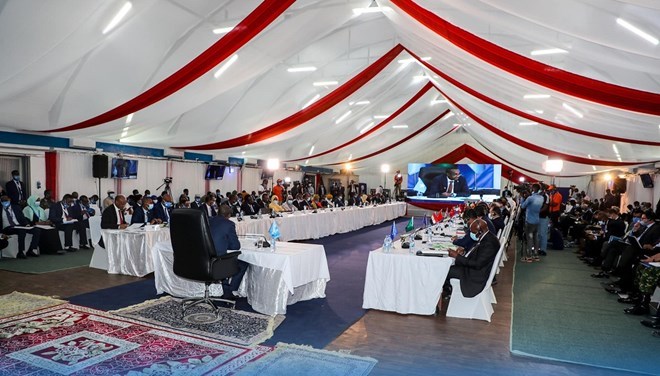
MOGADISHU (HOL) – The Somali Partnership Forum which brings together Somali leaders and the international community opened today in Mogadishu as political battles over the upcoming elections hit the rooftop.
The Forum which seeks to evaluate progress since the 2017 London Conference was opened by Prime Minister Mohamed Roble and is expected to conclude today.
Notable in the agenda is elections, transition plan and economic recovery in light of the triple effects of COVID-19, locust invasions and floods.The meeting happens at a time Somali’s leaders are embroiled in a bitter political dispute over the preparation for the upcoming elections.
On the one side is President Mohamed Farmaajo squaring off with Ahmed Madobe (Jubbaland) over elections in Gedo while on the other is the president’s battle with his opponents who have accused him of planning to influence the poll process.
Farmaajo, however, said Sunday he was committed to a ‘free and fair’ election.
A caucus of 14 presidential candidates has demanded the interim federal elections team appointed by Farmaajo be reconstituted since it was ‘packed with political cronies and civil servants’.
UN head in Somalia James Swan, his AMISOM counterpart Francisco Madeira and World Bank country representative Kristina Svensson will also address the forum.
Trump orders most US troops out of Somalia
Trump orders most US troops out of Somalia
The pullback is part of a larger effort to reduce US troop levels abroad before Donald Trump leaves office in January.
![The United States Africa Command (AFRICOM) has between 650 to 800 troops on average in Somalia [Senior Airman Kristin Savage/Combined Joint Task Force - Horn of Africa via AP]](https://www.aljazeera.com/wp-content/uploads/2020/12/AP_20331349514621.jpg?resize=770%2C513)
United States President Donald Trump has ordered the withdrawal of most American troops from Somalia, the defence department said in a statement on Friday, a move that is part of a global pullback of US forces before Trump leaves office next month.
The United States Africa Command (AFRICOM) has between 650 to 800 troops on average in Somalia, Al Jazeera reported in November, including special forces helping to train Somalia’s army.KEEP READINGFive dead, many wounded in suicide bomb attack in SomaliaTrump to announce further reduction in US troops in IraqTrump says US troops in Afghanistan should be ‘home by Christmas’
The Pentagon said Trump ordered a withdrawal of “the majority” of US troops “by early 2021”.
“The U.S. is not withdrawing or disengaging from Africa. We remain committed to our African partners and enduring support through a whole-of-government approach,” it said in its statement.
“While a change in force posture, this action is not a change in U.S. policy.”
The announcement comes after the Trump administration in mid-November said it planned to pull some US troops out of Iraq and Afghanistan before the Republican president leaves the White House in January.
The Pentagon said on November 17 that the number of US forces in Afghanistan would drop from 4,500 to 2,500, while troop levels in Iraq would go from 3,000 to 2,500.
Those reductions have drawn criticism from some in Washington, including Republican Senate Majority Leader Mitch McConnell, who said in November that “a precipitous drawdown in either Afghanistan or Iraq is a mistake”.
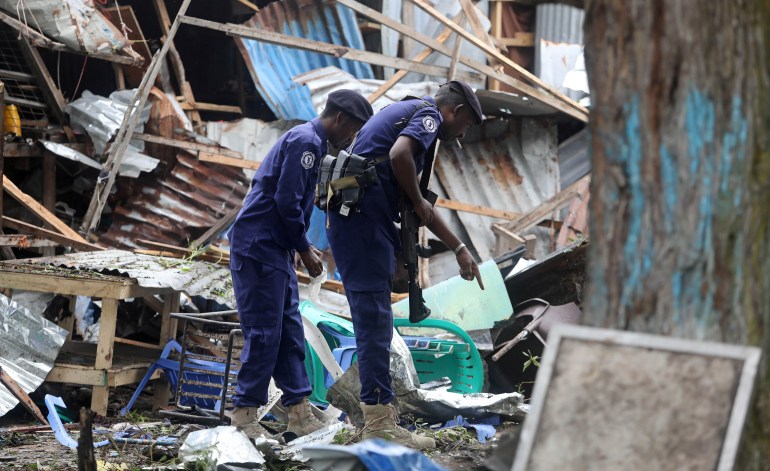
There was no immediate reaction from US legislators on the troop withdrawal from Somalia.
Abukar Arman, a former Somalia special envoy to the US, told Al Jazeera last month that “under Trump, American involvement in Somalia has been nothing short of a disaster.”
“There is no strategy; mercenaries and war-profiteers are running the show,” he said.
In its Friday statement, which was unsigned, the Pentagon sought to play down the implications of the withdrawal.
“The U.S. will retain the capability to conduct targeted counterterrorism operations in Somalia, and collect early warnings and indicators regarding threats to the homeland,” the Department said.
The Pentagon also said some US forces could be reassigned outside of East Africa.
An unspecified number would be repositioned into neighbouring countries, allowing for cross-border operations, it said.SOURCE : AL JAZEERA AND NEWS AGENCIES

